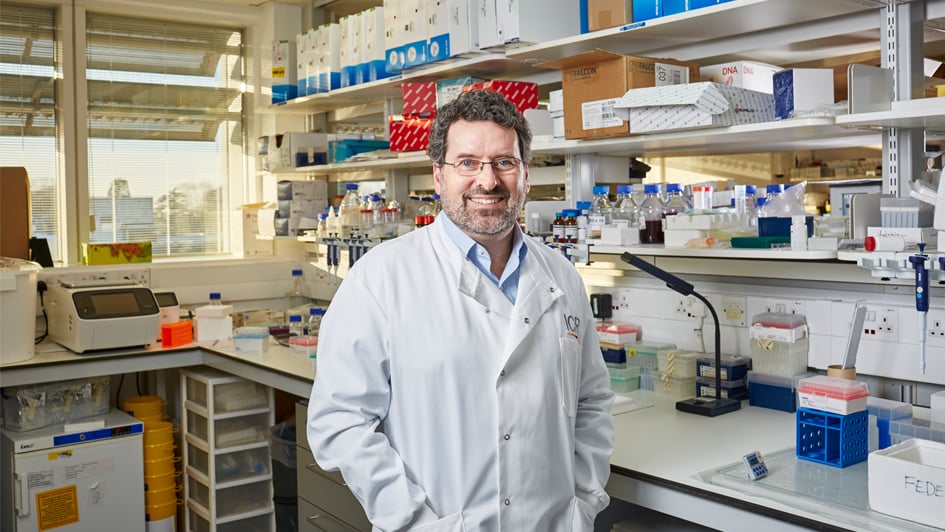
Image: Professor Louis Chesler. Credit: John Angerson
Children and young people in the UK with cancers that have come back can now access new personalised treatments quicker than ever before thanks to a national tumour biopsy sequencing platform and clinical trial funded by Cancer Research UK.
The genetic code of tumours are sequenced through the Stratified Medicine Paediatrics programme, and the molecular information is used to match patients to treatments on the ESMART trial, which is testing multiple new targeted drugs, and treatment combinations not previously available for children and young people.
Patients may be placed on ESMART within just a few weeks of having their tumours sequenced, offering children and young people with cancer who have limited treatment options quick access to the targeted drugs most likely to work for them.
The Stratified Medicine Paediatrics programme is being run by The Institute of Cancer Research, London, and ESMART is a European trial that is currently being rolled out across the UK. It is open at the trial’s lead centre, The Royal Marsden NHS Foundation Trust in London and the Royal Manchester Children’s Hospital. Further sites are to open in Birmingham, Newcastle and Great Ormond Street Hospital over the next few months.
Radically widening the scope of treatments
Cancer in children and young people is rare, and when it does occur, more than 80 per cent of those diagnosed survive their cancer for 5 years or more. However, this includes more common and, generally, more curable cancers. For more aggressive cancers such as neuroblastomas, and cases where cancer spreads or comes back after initial treatment, survival can be much lower and treatment options are fewer.
For the last two years in the UK, when a young person’s cancer comes back, their tumour has been routinely sequenced through the Stratified Medicine Paediatrics programme, which has been part-funded by the charity Children with Cancer UK. The findings are discussed by an expert panel of clinicians and scientists who recommend potential treatment options based on the specific gene faults identified in the tumour. But treatments have been very limited, and clinical trials often only test combinations of existing chemotherapy drugs or radiotherapy, or single molecularly targeted drugs.
The new ESMART clinical trial is now open in the UK and has been developed to radically widen the scope of treatments available for children and young people. Currently, the trial has 10 treatment arms (plus five more that are awaiting regulatory approval) that are testing an array of therapies on their own or in combination, including targeted drugs, immunotherapies, radiotherapy and chemotherapy. And as researchers develop promising new drugs, they are quickly rolled into the study.
Both the ESMART trial and the Stratified Medicine Paediatrics programme stem from earlier research funded by one of the ICR's family charity partners, Christopher's Smile, which was founded by Kevin and Karen Capel. The Capels have fundraised and campaigned tirelessly to improve the treatment for children with cancer after their son Christopher died from medulloblastoma in 2008.
Valuable information on specific tumour features
Professor Louis Chesler, who leads the Stratified Medicine Paediatrics programme at The Institute of Cancer Research, London, said:
“Our Stratified Medicine Paediatrics programme goes beyond the traditional DNA sequencing of tumours, because the platform also gives us valuable information on specific features of the tumour that could be targeted by precision medicines. This was a big step forward, and it’s brilliant to now also have access to the newest treatments that we know could work for our patients.
“Combined with the ESMART trial, the Stratified Medicine Paediatrics programme gives us an outstanding array of treatments and combinations to choose from to give children and young people the best possible treatment options for them. Combined with our ongoing work of improving the diagnosis of young people’s cancer, and understanding more about what is causing treatment resistance and relapse, the future is looking more optimistic for our young patients, which is fantastic news for them and their families.”
Bringing hope for families
Dr Lynley Marshall, UK chief investigator of the ESMART trial and Oak Foundation Consultant in Paediatric and Adolescent Oncology Drug Development at The Royal Marsden, said:
“We’ve spent years trying to get a more targeted approach to children’s cancers in place, and we’re really proud to have helped develop ESMART and to have it available in the UK.
“But more importantly, it brings hope for families that may have lived through multiple relapses. The fact of just knowing that there’s something else that they can try with the real possibility of benefit makes all the difference.”
Michelle Mitchell, chief executive at Cancer Research UK, said:
“We know that cancer in children and young people is different to that in adults, and that research into them faces its own challenges that can prevent progress. Our research strategy for children and young people’s cancers that we launched last year is designed specifically to help address these unique challenges and drive progress in this area.
“The Stratified Medicine Paediatrics programme and ESMART are wonderful examples of the work we fund that is revolutionising the way children and young people with cancer are treated in the UK, and I look forward to seeing the ways they develop in the future.”